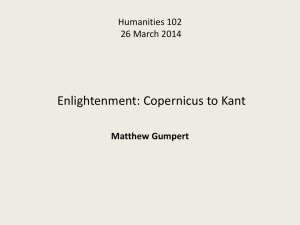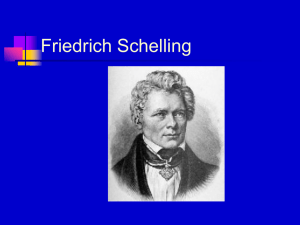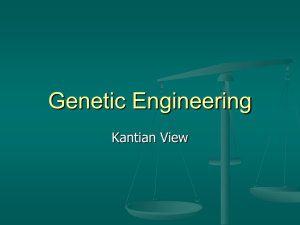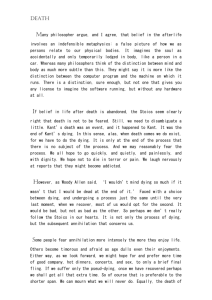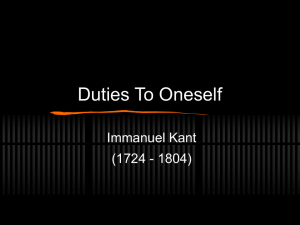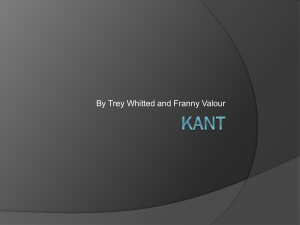Syllabus
advertisement
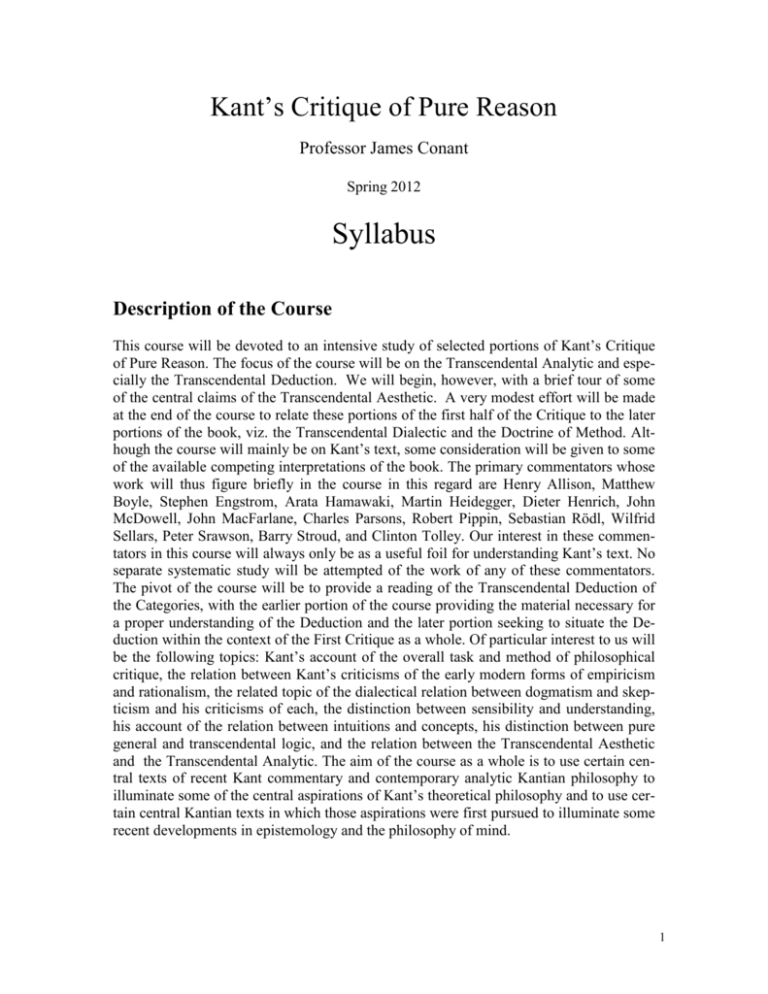
Kant’s Critique of Pure Reason Professor James Conant Spring 2012 Syllabus Description of the Course This course will be devoted to an intensive study of selected portions of Kant’s Critique of Pure Reason. The focus of the course will be on the Transcendental Analytic and especially the Transcendental Deduction. We will begin, however, with a brief tour of some of the central claims of the Transcendental Aesthetic. A very modest effort will be made at the end of the course to relate these portions of the first half of the Critique to the later portions of the book, viz. the Transcendental Dialectic and the Doctrine of Method. Although the course will mainly be on Kant’s text, some consideration will be given to some of the available competing interpretations of the book. The primary commentators whose work will thus figure briefly in the course in this regard are Henry Allison, Matthew Boyle, Stephen Engstrom, Arata Hamawaki, Martin Heidegger, Dieter Henrich, John McDowell, John MacFarlane, Charles Parsons, Robert Pippin, Sebastian Rödl, Wilfrid Sellars, Peter Srawson, Barry Stroud, and Clinton Tolley. Our interest in these commentators in this course will always only be as a useful foil for understanding Kant’s text. No separate systematic study will be attempted of the work of any of these commentators. The pivot of the course will be to provide a reading of the Transcendental Deduction of the Categories, with the earlier portion of the course providing the material necessary for a proper understanding of the Deduction and the later portion seeking to situate the Deduction within the context of the First Critique as a whole. Of particular interest to us will be the following topics: Kant’s account of the overall task and method of philosophical critique, the relation between Kant’s criticisms of the early modern forms of empiricism and rationalism, the related topic of the dialectical relation between dogmatism and skepticism and his criticisms of each, the distinction between sensibility and understanding, his account of the relation between intuitions and concepts, his distinction between pure general and transcendental logic, and the relation between the Transcendental Aesthetic and the Transcendental Analytic. The aim of the course as a whole is to use certain central texts of recent Kant commentary and contemporary analytic Kantian philosophy to illuminate some of the central aspirations of Kant’s theoretical philosophy and to use certain central Kantian texts in which those aspirations were first pursued to illuminate some recent developments in epistemology and the philosophy of mind. 1 Instructors Professor Course assistant James Conant Ben Pierce Office: Stuart 208 Office Phone: 773 702 6146 e-mail: jconant@uchicago.edu Office Hours: Thursdays 10:00-11:00, or by appointment. Office: Classics Café e-mail: benpierce@uchicago.edu Readings Books All of the following textbooks have been ordered through the Seminary Co-op and are all required texts for the course: 1. Immanuel Kant, Critique of Pure Reason, trans. Norman Kemp Smith. ISBN: 9780230013384 2. Immanuel Kant, Logic, (Dover Press edition), Robert S. Hartman and Wolfgang Schwarz. ISBN: 978-0486256504 3. Immanuel Kant, Prolegomena to Any Future Metaphysics, revised trans. Paul Carus and Lewis White Beck ISBN: 978-0023193309 4. Henry Allison, Kant’s Transcendental Idealism: An Interpretation and Defense, Revised and Expanded Edition ISBN: 978-0300102666 5. P. F. Strawson, The Bounds of Sense ISBN: 978-0415040303 Some, but by no means all, of the readings assigned for the course are to be found in one of the five texts above. The rest of the readings will be made available through the Chalk site of the course. If you ever encounter any problem obtaining an assigned reading for the course, you should immediately contact the course assistants for the course by e-mail and let them know about the problem. Chalk Site There is a Chalk website for this course (chalk.uchicago.edu). All readings listed on the syllabus not available in one of the books ordered for the course are to be found on this site. In addition, a great many readings not mentioned on the syllabus are also to be found on this site. The latter generally pertain to topics discussed in passing in lecture and are made available for students who wish to pursue them further, perhaps in a final paper for the course. 2 Structure of the Course and Related Issues Meeting Times and Location: The course will meet on Tuesdays and Thursdays, from noon to 1:20 pm, in Stuart 102. Undergraduate Students: This course is open to any undergraduate who has secured permission to enroll in it. Graduate Students: This course is open to all graduate students. Policy on Auditors: Anyone with a serious interest in the topic is welcome to audit the course. Announcements: Announcements (modifications to the syllabus, etc.) will periodically be posted to the Chalk site. Students are expected to keep abreast of these. Course Participation: All students involved in the course are expected to attend class regularly and be conversant with the required readings. Undergraduate Discussion Sections: There will be two undergraduate discussion sections for the course, taught by Ben Pierce. Every undergraduate must be assigned to and regularly attend one of these sections. Weekly attendance of sections is mandatory for undergraduates. The time schedules and locations of these sections are: Friday, 9:30-10:20 in Harper 151; and Friday, 10:30-11:20 in Harper 151. Graduate Discussion Section: There will be a graduate discussion section for the course. It will be led by Professor Conant. It will meet on Tuesdays, from 3 to 4:30pm in Cobb 104. The graduate section will begin meeting during the second week of the quarter. It is open to all PhD and MA students either enrolled in or auditing the course. Attendance of the graduate section is an optional component of the course for graduate students enrolled for credit. Undergraduate Course Requirements: There are three required elements for the course: (1) mandatory attendance and participation in discussion sections, (2) a short midterm paper (6-8 pages) due by February 10 at 11:59pm, at the beginning of week 6; (3) a longer paper (12-15 pages) due by March 21 at 11:59pm, at the end of week 11. Special deadlines will be arranged for graduating seniors. All undergraduate papers are to be delivered to Ben Pierce in electronic form. Undergraduate Grade Breakdown: 15% for participation in discussion section; 35% for the short midterm paper, and 50% for the long final paper. To pass the course you must receive a passing grade in every required component of the course: A failing grade in any one of the three required components of the course will result in a failing grade for the course as a whole. Graduate Course Requirements: Graduate students taking the course for credit are expected write a term paper at the end of the quarter, due on Friday, March 21st, of 11th week at 5pm. Papers are to be submitted via email to Prof. Conant in electronic form. The final paper is the only official requirement for graduate students enrolled in the course. It may be on any topic of your choice pertaining to themes covered in the lecture. Graduate student papers (both M. A. and Ph.D.) should be between 15 and 30 pages. Policy on Extensions for Graduate Student Papers: Graduate students may hand in their final papers after the official due date and still receive credit for the course, only if they have secured permission from the professor to do so. Any student granted an extension should also be aware of the following: such papers will not be graded immediately upon receipt. The later the paper, the less promptly it will be graded. 3 Schedule of Meetings, Topics and Readings First Meeting (Tues., Jan. 7) - Organizational and Introductory Meeting Themes of the course, explanation of approach, overview of the syllabus. Brief overview of Kant’s philosophy and of the structure of the Critique. Explanation of some basic terminology and bibliographical conventions. Discussion of major works in theoretical philosophy by Kant and the alternative English translations thereof. Required Reading: No required reading. Suggested Reading: Wood, Alan, “Kant's Life and Works" Second Meeting (Thursday, Jan. 9) - Prefaces Required Readings: Kant, Critique of Pure Reason, Avii–xxii; Bvii–xliv Kant, Prolegomena, “Introduction” and “Preamble”, AA IV 255-264 Kant,“Letter to Marcus Herz, May 26, 1789” Henrich, Dieter “Kant’s Notion of a Deduction and the Methodological Background of the First Critique” Suggested Readings: Förster, Eckart, The 25 Years of Philosophy, Chapter 1: “Kant’s Revolution in the Mode of Thought” Kant, Critique of Pure Reason, A726/B754-A736/B764; A759/B788A769/B797 4 Third Meeting (Tuesday, Jan. 14) - Introduction Required Readings: Kant, Critique of Pure Reason A1/B1–A16/B30; A319/B376–A320/B377 Kant, Logic, Section 1: “The Concept of Logic”, pp. 13-18 Suggested Readings: Strawson, Peter F., The Bounds of Sense, Part 1, pp. 15-44 Allison, Henry, Kant’s Transcendental Idealism, 2nd Edition, Chapter 1, Section 1: “An Introduction to the Problem” Fourth Meeting (Thursday, Jan. 16) - Sensibility and Understanding Required Readings: Stephen Engstrom, “Understanding and Sensibility” Suggested Readings: Heidegger, Martin, Kant and the Problem of Metaphysics pp. 3-26 Franks, Paul, All or Nothing, excerpt Schlick, Moritz, “The Nature of Knowledge” Lewis, C. I., Mind and the World Order, Chapters 1 and 2 Fifth Meeting (Tuesday, Jan. 21) - Sensation and Intuition Required Readings: Allison, Henry, Kant’s Transcendental Idealism, 2nd Edition, Chapter 2, Section 4, “Discursivity and Judgment” Beck, Lewis White, “Did the Sage of Königsberg have no Dreams?” Suggested Readings: Allison, Henry, Kant’s Transcendental Idealism, 1st Edition, Part 2, Section 4, “Discursivity and Judgment” & 2nd Edition, Part 2, Section 5, “The Sensible Conditions of Human Cognition” Thompson, Manley, “Singular Terms and Intuitions in Kant’s Epistemology” Parsons, Charles, “Kant’s Philosophy of Arithmetic” Bennett, Jonathan, Kant’s Dialectic, excerpt 5 Sixth Meeting (Thursday, Jan. 23) - The Transcendental Aesthetic Required Readings: Kant, Critique of Pure Reason A19/B33–A49/B73 Strawson, Peter F., The Bounds of Sense, Part 2, Chapter 1: “Space and Time" Parsons, Charles, “The Transcendental Aesthetic” Suggested Readings: Warren, Daniel, “Kant on the Apriority of Space” Allison, Kant’s Transcendental Idealism, 2nd Edition, pp. 97 - 116 Seventh Meeting (Tuesday, Jan. 28) - Overview of Kant on Logic Required readings: Conant, James, “The Search for Logically Alien Thought,” pp. 123-134 Kant, Critique of Pure Reason, A50/B74-A83/B115 Tolley, Clinton, “Kant on the Generality of Logic” Suggested readings: Tolley, Clinton, “Kant on the Nature of Logical Laws” Tolley, Clinton, “Kant on the Normativity of Logic” MacFarlane, John, “Kant and the Formality of Logic” Eighth Meeting (Thursday, Jan. 30) - General Logic Required Readings: Kant, Critique of Pure Reason A50/B74–A55/B79 Boyle, Matthew, “Kant on Logic and the Laws of the Understanding” Suggested Readings: MacFarlane, John, “Kant, Frege and the Logic in Logicism” Boyle, Matthew, “Kant’s Hylomorphism” Kneale & Kneale, The Development of Logic, pp. 354 - 358 Ninth Meeting (Tuesday, Feb. 4) - Transcendental Logic Required Readings: Kant, Critique of Pure Reason A55/B79–A64/B89 Rödl, Sebastian, “Logical Form as Relation to an Object” 6 Suggested Readings: Rosenkoetter , Timothy, "Truth Criteria and the Very Idea of a Transcendental Logic” Tenth Meeting (Thursday, Feb. 6) - The Leitfaden Required Readings: Kant, Critique of Pure Reason A64/B89–A84/B116 Strawson, Peter F. The Bounds of Sense, Part 2, Chapter 2: “Objectivity and Unity”, Sections 1-2. Suggested Readings: Hoeppner, Till, "Kant's Metaphysical Deduction of the Categories. An Interpretation of A 79" Blecher, Ian, “Kant on Formal Modality" Longuenesse, Beatrice, “Kant on A Priori Concepts" Rosenkoetter, Timothy, "Absolute Positing, the Frege Anticipation Thesis, and Kant’s Definitions of Judgment” Eleventh Meeting (Tuesday, Feb. 11) - Transcendental Argument(s) Required readings: Stroud, Barry, “Transcendental Arguments” Hamawaki, Arata, “Cartesian Skepticism, Kantian Skepticism, and Transcendental Arguments” Conant, James, “Varieties of Skepticism,” pp. 97-115 Suggested readings: Conant, James, “Varieties of Skepticism,” pp. 115-136 Moore, G. E., “Moore’s Paradox” Marcus, Eric, Rational Causation, pp. 18 - 36 Twelfth Meeting (Thursday, Feb. 13) - A-Edition of the Transcendental Deduction Required Readings: Kant, Critique of Pure Reason A84/B116–A95/B129; A95–A130 7 Strawson, Peter F., “Imagination and Perception” Strawson, The Bounds of Sense, Part 2, Ch. 2: “Objectivity and Unity”, Sections 3-9. Suggested Readings: Pippin, Robert, Kant’s Theory of Form, Chapter 6, “The First-Edition Deduction”, pp. 151-166. Engstrom, Stephen, “The Transcendental Deduction and Skepticism” Sellars, Wilfred, Science and Metaphysics, Chapter 1; “Some Remarks on Kant’s Theory of Experience”, & “The Role of Imagination in Kant’s Theory of Experience” McDowell, John, “Sellars on Perceptual Experience” & “The Logical Form of an Intuition” Kern, Andrea, “Spontaneity and Receptivity in Kant’s Theory of Knowledge” Thirteenth Meeting (Tuesday, Feb. 18) - Four Choice Points Required Readings: Conant, James, “Kant’s Critique of the Layer-Cake Conception I” Suggested Readings: Engstrom, Stephen, “The Transcendental Deduction and Skepticism” Boyle, Matthew, “Tack-on Theories of Rationality” Rödl, Sebastian, Categories of the Temporal, Chapter 1 Kern, Andrea, "Learning to Perceive" Boyle, Matthew, “Essentially Rational Animals” Fourteenth Meeting (Thursday, Feb. 20) - The Structure of the BDeduction Required Readings: Henrich, Dieter “The Proof Structure of the B-Deduction” Conant, James, “Kant’s Critique of the Layer-Cake Conception II” Pippin, Robert, Hegel’s Idealism, Ch. 2, Section 1 (pp.16-24) Suggested Readings: Allison, Henry, “Reflections on the B Deduction Pippin, Robert, Hegel’s Idealism, Ch. 2, Sections 2-4 (pp.24ff.) McCann, Ed, “Skepticism and Kant’s B Deduction" 8 Hanna, “Kant's Non-Conceptualism, Rogue Objects and the Gap in the B Deduction" Grüne, “Is there a Gap in Kant’s B Deduction?” Fifteenth Meeting (Tuesday, Feb. 25) - The First Half of the B-Edition of the Deduction: §§16-21 Required Readings: Kant, Critique of Pure Reason B129–146. Allison, Henry, Kant’s Transcendental Idealism, 1st Edition, Chapter 3, Section 7: “Objective Validity and Objective Reality” Engstrom, Stephen, “Unity of Apperception" Suggested Readings: Kant, Prolegomena, Part 2 Section 18-19, AA IV 298-300. Allison, Henry, Kant’s Transcendental Idealism, 2nd Edition, Part 3, Section 7: “The Transcendental Deduction” Pippin, Robert, Kant’s Theory of Form, Chapter 6, “The Second-Edition Deduction”, pp. 166-187. Sixteenth Meeting (Thursday, Feb. 27) - The Second Half of the BEdition of the Deduction: §§21-27 Required Readings: Kant, Critique of Pure Reason B144–169. McDowell, John, “Hegel’s Idealism as a Radicalization of Kant”, Sections 1-4 Bauer, Nathan, “Kant’s Subjective Deduction” Suggested Readings: Bauer, Nathan “Peculiar Intuition” McDowell, John, “Sensory Consciousness in Kant and Sellars” & “SelfDetermining Subjectivity and External Constraint” Seventeenth Meeting (Tuesday, March 4) - Understanding and Judgment Required Readings: Land, Thomas, “Kant’s Spontaneity Thesis” 9 Suggested Readings: McDowell, John, “Reply to Pippin”, “On Pippin’s Postscript” Pippin, Robert, “Leaving Nature Behind” & “On McDowell’s Response” Land, Thomas, “Kantian Conceptualism” Eighteenth Meeting (Thursday, March 6) - 1st and 2nd Analogies Required Readings: Kant, Critique of Pure Reason A176/B218–A211/B256; B274–279. Strawson, The Bounds of Sense, Part 2, Ch. 3: “Permanence and Causality” Boyle, Matt, “Sortalism and Perceptual Content” Rödl, Sebastian, Categories of the Temporal, Ch. 6: “Generic Thoughts” Suggested Readings: Melnick, Arthur, “The Second Analogy” Allison, Henry, Kant’s Transcendental Idealism, 2nd Edition, Part 3, Sec. 9: “The Analogies of Experience” Warren, Daniel, “Kant’s Dynamics” Nineteenth Meeting (Tuesday, March 11) Refutation of Idealism & The Ground of the Distinction of All Objects into Phenomena and Noumena Required Readings: Kant, Critique of Pure Reason B274–279; A235/B294–A260/B315. Allison, Henry, Kant’s Transcendental Idealism, 2nd Edition, Part 1, Secs 2-3 Warren, Daniel, “Things in Themselves” Heidegger, Martin, Phenomenological Interpretations of Kant, pp. 67-70. Pippin, Robert, Kant’s Theory of Form, Chapter 7, “Appearances and Things in Themselves”, pp. 188-215. Suggested Readings: Carl, Wolfgang, “Kant’s Refutation of Problematic Idealism” Edmunts, Dina “The Refutation of Idealism” Strawson, Peter F., The Bounds of Sense, Part IV: “The Metaphysics of Transcendental Idealism” Allison, Henry, “The Non-Spatiality of Things in Themselves for Kant” 1 0 Twentieth Meeting (Thursday, March 13) -- Optional Meeting Introduction to the Transcendental Dialectic, the Logic of Illusion, and the Transcendental Doctrine of Method Required Readings: Kant, Critique of Pure Reason A293/B349–A338/B396; A707/B735– A794/B822 Strawson, Peter, The Bounds of Sense, Part 3, Chap. 1: “The Logic of Illusion” Allison, Henry, Kant’s Transcendental Idealism, 2nd Edition, Part 4, Sec. 11: “Reason and Illusion” Suggested Readings: Kant, Critique of Pure Reason A405/B432–A462/B490; A794/B822A856/B884 Strawson, Peter, The Bounds of Sense, Part 3, Chapters 2, 3 & 4: “The Soul”, “The Cosmos”, and “God” Allison, Henry, Kant’s Transcendental Idealism, 2nd Edition, Part 4, Sections 12-14 Moore, Adrian, “The Transcendental Doctrine of Method” Twenty-First Meeting (Tuesday, March 18) - Optional Meeting General Discussion and Retrospective 1 1


